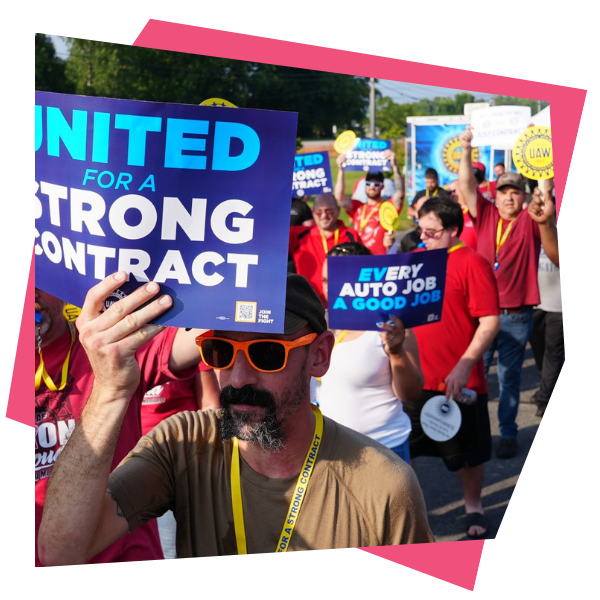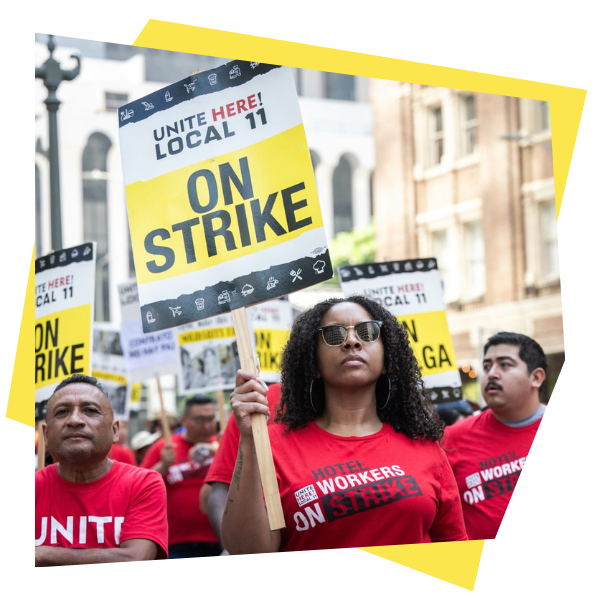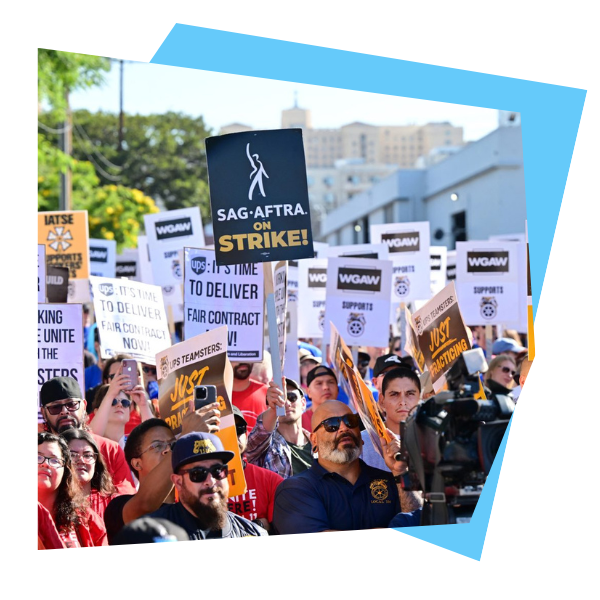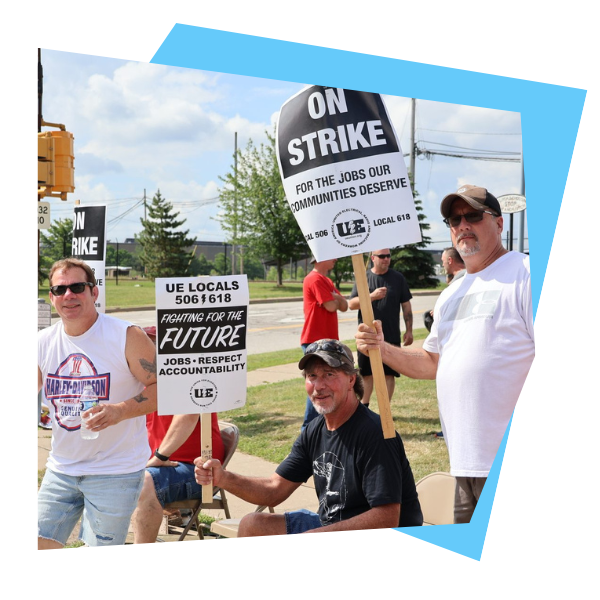
Happy Labor Day! We’re in a moment of a historic groundswell of grassroots labor organizing. From victories for UPS workers to ongoing strikes for hotel workers, people across the country are advocating for economic justice. This month’s Network Download highlights collaborative governance between local electeds and the labor movement and provides updates on some key worker actions.
NEW TODAY: Local Progress Impact Lab releases Localities Take Action to Protect Workers: A Report for Labor Day 2023
Increasingly, local governments are leveraging their powers to improve working conditions and advance worker protections. Since Labor Day last year, Local Progress Impact Lab has been tracking local policy developments around workers rights.
In recent years, local governments have played a larger role in protecting workers from the legislative side. Lynn, MA reestablished their Wage Theft Advisory Committee after a COVID-era hiatus. Detroit City Council created the country’s first-ever industry standards board for arena workers. Waco, TX acted as a model local employer by adding six weeks of parental leave for city employees, regardless of gender or parental status. Localities across the country have worked to raise labor standards, from anti-discrimination laws in Seattle to fair scheduling practices in Evanston to domestic worker protections in Washington, D.C. And local elected officials have been using their soft power as public influencers to demonstrate solidarity with workers’ union drives, contract negotiations, strikes, and other actions.
This new report – in partnership with the State and Local Enforcement Project, which is housed at the Center for Labor and a Just Economy (CLJE) at Harvard Law School and at the Economic Policy Institute – provides a comprehensive overview of over 75 pro-worker actions that localities have taken in the past year to create a world where working people can thrive.
As Shawn Fain, president of UAW, reminds us, “all of us are at war with corporate greed and with companies that are prioritizing profits over people.” Although they may appear different, the struggles of truck drivers, baristas, autoworkers, writers, and actors are all the same workers movement.
UPS Workers Overwhelmingly Ratify Historic Contract
After months of organizing and demonstrating worker power through practice pickets, UPS workers ratified a new contract with 86.3% approval last month. The historic contract includes gains like the end of the two-tier wage system, pay raises for all workers and a new $21 floor for part-time workers, an end to forced overtime, air conditioning in all new vehicles, MLK Day as an official paid holiday, and the creation of 7,500 new full-time positions. In the leadup to a possible strike, UPS workers organized practice pickets and Local Progress members like Philadelphia City Councilmember Kendra Brooks, Minneapolis City Council Members Aisha Chugtai, and Agawam City Councilor Tom Hendrickson joined them to show solidarity. These wins are reverberating across the country, inspiring workers to organize and fight for a fair share, and also highlight the importance of collaborative governance across labor unions, community organizations, and elected officials. Read more here →
Historic Double Strike of SAG-AFTRA Actors and WGA Workers Continues
After negotiations with Hollywood studios broke down, writers represented by WGA began striking in May, with actors represented by SAG-AFTRA joining them soon after in July. As media giants continue to rake in huge profits, the two unions are holding strong on their terms around residuals for streaming shows, the use of AI, the number of writers that shows must use and lengths of employment. Countless Local Progress members have joined the picket line or passed resolutions to support the strike. In addition to that solidarity, Local Progress Member and Los Angeles City Controller Kenneth Mejia creatively used the power of his office to investigate Universal Studios’s attempt to break up the picket line by cutting down trees without a permit and exposing protestors to extreme heat conditions. Additionally, Local Progress Member and New York City Comptroller Brad Lander sent letters to three major entertainment companies detailing how they’re threatening long-term pension fund investments by refusing to meet worker demands and continuing to extend the strikes. Read more here →
Autoworkers with UAW Gear Up for a Possible Strike
With the contract for the three biggest automakers—General Motors, Ford Motor and Stellantis—set to expire September 14, eyes are on UAW members now for a potential strike. Workers voted by 97% to approve a strike if union leaders deem it necessary to get a fair contract. UAW’s demands for the next contract include “46% wage increases, restoration of traditional pensions, cost-of-living increases, reducing the workweek to 32 hours from 40 and increasing retiree benefits.” Additional demands include getting rid of the current tiered wage system and ensuring a just transition for workers as automakers move to electric vehicles. Local Progress members like Pleasant Hill City Councilmember Ross Grooters and Cook County Commissioner Anthony Quezada are already expressing their support for UAW workers if the companies force a strike. Read more here →
UNITE HERE Hotel Workers Continue Largest Hotel Strike in History
Since July, Hotel workers in southern California with UNITE HERE have been continuing rolling strikes to demand higher pay and better benefits, like improved health care. The demands also include a hospitality workforce housing fund to allow workers to live closer to the hotels where they work as the cost of housing continues to increase in southern California. Most recently, the union has called for a convention boycott of Los Angeles to put additional pressure on the hotels. Local 11 represents 15,000 hotel workers, including housekeepers, servers, and bartenders, making this the largest strike in the hotel industry’s history. In addition to joining the picket line, Local Progress members across southern California have signed letters asking for a deescalation of violence towards protestors and calling on Taylor Swift to postpone shows in the LA area. Read more here →
Procurement – the process by which governments contract public goods and services – is an often routine process that can instead be creatively leveraged by the government to advance and protect the public interest. At the local level, procurement includes the flow of public funds to private entities for everything from trash pickup and park maintenance, to public health programs, to the purchase of textbooks for students, to the complex technological systems that undergird many public services. This report – a collaboration between Local Progress Impact Lab and In The Public Interest – offers a roadmap for community advocates and local elected officials to examine how governmental entities can better design their procurement processes to improve lives for residents, including the advancement of workers’ rights, without merely serving as a slush fund for third party contractors. Read the full report →
📝 From Big Business To A Liberation Economy: A Racial Justice Agenda for Reining in Monopoly Power
Liberation in a Generation’s new report analyzes the current economy we live in – an “Oppression Economy” where big business and corporations govern the country at the expense of people of color and our democracy. The report envisions an alternative: the Liberation Economy, rooted in collaborative governance where power is shared with communities and movements to create a world where everyone can thrive. Creating a Liberation Economy requires comprehensive policy solutions that curb corporate power, enhance worker rights, rebalance tax structures, regain control over financial resources, and prioritize essential public services. Read the full report →
📝 Using Federal Funds for Racial & Economic Justice
The Infrastructure Investment and Jobs Act (IIJA) and Inflation Reduction Act (IRA) will invest trillions of dollars of federal funding to fight climate change. This is an opportunity for local governments to advance racial and economic justice by funding high road jobs and training programs, developing public capacity and countering decades of environmental harm; but there are also risks of displacement pressure and further privatization. Local Progress Impact Lab’s memo helps local elected officials and organized communities seize this opportunity to build public union-made infrastructure and further environmental justice. Read the memo →
📝 The Role Of Local Government In Protecting Workers’ Rights
In the middle of historic labor organizing, cities, counties, and other localities have become innovators and leaders in advancing workers’ rights. A number of localities have come to view protecting workers and improving their working conditions as part of their core municipal function. This 2022 report – a joint project by Local Progress Impact Lab, Economic Policy Institute, and the Harvard Center for Labor and a Just Economy – details how local governments are passing notable pro-worker legislation like creating labor agencies, improving enforcement, serving as model employers with city workers, and more. Read the full report →
Minneapolis City Councilmember Robin Wonsley
Originally from Chicago, Robin Wonsley studied at Carleton College and completed a Watson fellowship before moving to the Twin Cities in 2014. After working with a variety of community organizations and coalitions for racial justice and workers’ rights, Robin was elected as Minneapolis’ first Black Independent Democratic Socialist City Council Member. Robin represents Ward 2, which includes the University of Minnesota. Robin joined fellow Local Progress Member and Minneapolis Council Member Jason Chavez and Minneapolis Council Member Jamal Osman to introduce and pass Fair Drives Safe Rides to guarantee better pay and protections for rideshare drives across Minneapolis, until Mayor Frey ultimately decided to veto the legislation.
On how Fair Drives Safe Rides came to be:
“We took the initiative on Fair Drives Safe Rides at the end of 2022 after drivers came to City Hall to demand that elected officials stand with them and pass a policy. They were organized and clear about what kinds of regulations they needed in order to be able to make a fair living in their industry.”
On the need for worker protections:
“Workers’ rights have been a fundamental part of my personal and political development, starting from the time I was growing up and seeing how working conditions impacted my family and community. Those experiences led me to work on the Fight for $15 in Minneapolis, and then to support our public schools by working with Education Minnesota, the statewide teachers’ union. I see workers’ rights fights as intimately tied to racial justice, gender justice, and climate justice. It’s the basis of all our struggles for a new model of society, where working class people have autonomy and a real voice in society.”
On what’s next in the fight for gig worker protections:
“Rideshare drivers are not stopping their organizing and I will be there with them. We are going to continue to move forward legislation at the city level and state legislators are continuing their efforts when the 2024 legislative session begins. The drivers’ fight has a lot of technical and policy elements that can be a blueprint for other gig workers’ struggles. And it adds to the explosive momentum in workers’ rights organizing across sectors and across the country. Hot labor summer is just getting started.”
- It’s All the Same Fight | The American Prospect
- Corporate Greed is a Moral Crisis. Working People Are Fighting Back. | In These Times
- D.C.’s Street Vendor Regulations Formalize The Informal | Next City
- A 4-Day Workweek Gains Lawmaker Support In Some States | Next City
- Workers Are About To Get Way More Power | More Perfect Union
- In a Summer of Record Heat, These Striking Workers Are Making Climate Demands | In These Times
- Workers continue the fight 60 years after the March on Washington | Prism
- OK, I’ve Seen Enough. This Time Is Different. | The Forge












